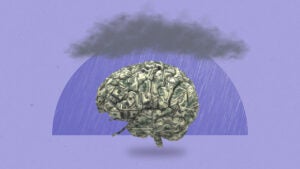Survey: Surprisingly fewer people losing sleep over money issues right now


To say that 2020 has been a tough year is an understatement. A global health pandemic, followed by a recession and racial tensions, is 2020’s narrative — one that won’t be forgotten for a very long time. And though the impact of this year has been difficult for many, the number of people losing sleep because of money, health and relationship issues is actually down from last year.
With unemployment rates at their worst since the Great Depression, it’s not surprising that 48% of U.S. adults report losing sleep, at least occasionally, about a money issue. The surprise in the latest Bankrate survey is that the number of people lying awake at night has dropped 8% from 56% just one year ago.
“I’m really surprised Americans are more upbeat this year than they were last year,” says Ted Rossman, industry analyst at Bankrate. “Right now, we’re experiencing some of the greatest societal, health and monetary challenges of our lifetimes. Yet in the face of all that, our survey found consistent improvement from last year.”
Top reasons Americans are losing sleep
When asked to narrow the cause of their sleepless nights, 23% of U.S. adults answered that money issues, mainly the ability to pay everyday bills, was the number one reason. In 2019, 32% of respondents revealed money woes weighed heavily on their minds.
Rossman says that stimulus programs and expanded unemployment, along with the small business paycheck protection program, could be responsible for the decline in the number of Americans who are feeling anxious.
“I think for the short-term, these efforts seem to be helping people and hopefully the situation improves or more help is on the way, but data coming in suggests that the stimulus checks really seemed to help people pay their bills,” Rossman says.
Why Generation X women are losing the most sleep
In every category surveyed, women are slightly more worried than men about relationships with their friends, climate change, racial tensions and raising children — with 79% of women more likely to lose sleep compared to 70% of men. Whether biological or a result of the number of women working in industries that have taken the hardest hits, the Institute for Women’s Policy Research reports that 58.8% of the 701,000 jobs lost from February to early April were held by women.
Aside from money concerns, relationships are the next major category costing Americans sleep. Some 39% of respondents are struggling with some type of relationship — whether it’s the inability to see their loved ones and friends, or perhaps spending too much time with their significant other.
Rossman explains that many Gen X women are sandwiched between caring for both their kids and parents simultaneously. COVID-19 has stretched women to play parent, teacher and caregiver to aging parents while also working from home or dealing with a job loss. The combined pressures leave women feeling stressed and unable to switch their minds off at night to refuel for the next day.
Slight decline in optimism
Despite the curveball 2020 has thrown many Americans, people are only slightly less optimistic than they were a year ago; 59% of respondents say they’re optimistic they’ll be able to resolve their top issues, down from 63% last year.
The coronavirus pandemic might be to blame when it comes to this minor decline in optimism. In fact, 52% of U.S. adults currently losing sleep say the pandemic has had a negative impact on their ability to resolve the biggest cause of their sleep loss. 39% say there was not much change either way, and 10% say it’s had a positive impact.
“People worry about all kinds of things that are both inside and outside of their control, but one of the best things to do is to know where to draw the line between what you can and can’t control and come up with a plan,” Rossman says. “Whether you’re worried about finances or friends, devising a plan to improve your situation might make you feel better. And while it’s a daunting task that may not be resolved quickly, at least you’ve got a plan in place and you’re hopefully making progress.”
Rossman suggests that if you don’t have a lot in savings and don’t have money coming in, debt payoff may not be your top goal — and that’s ok. Your chief priority should be staying afloat during the crisis and seeking help from professionals if you need it.
Ask for help
If you’re struggling to pay your credit card bills on top of rent or mortgage, seek help. Banks, credit card issuers and mortgage companies are offering assistance programs that can help you remain in good standing with your issuer in the short-term and safeguard your credit score from long-lasting effects.
Nonprofit credit counseling
If overwhelming debt was a problem before COVID-19, it’s a smart move to begin credit counseling to get and stay out of debt. Most credit counseling services are nonprofit organizations with certified and trained counselors that will discuss your financial situation and help you develop a personalized plan to help solve your money issues. Debt.org has a list of the top credit counseling agencies in the U.S.
Rossman says that now is not the time to put additional pressure on yourself. “We always provide guidance on managing money because we’re a financial website, but now is really the time to take care of your mental and emotional needs — realizing that most of what’s happening is out of our control.”
Methodology
Bankrate.com commissioned YouGov Plc to conduct the survey. All figures, unless otherwise stated, are from YouGov Plc. Total sample size was 2,556 adults. Fieldwork was undertaken on June 3-5, 2020. The survey was carried out online and meets rigorous quality standards. It employed a non-probability-based sample using both quotas upfront during collection and then a weighting scheme on the back end designed and proven to provide nationally representative results.




